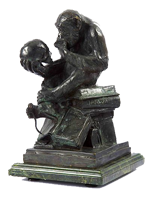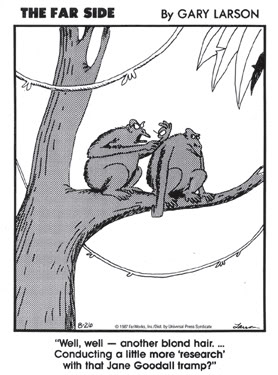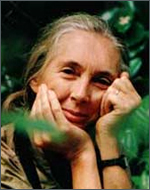

|
Jane Goodall
Thursday, August 25, 2011 | Meet
Hominidae Homininae Hominini Panina Pan troglodytes. Chimpanzees. Chimps. One can hardly mention Jane Goodall without evoking our closest living relatives and hairy Hominini tribemates, Chimpanzees.
Dame Jane Morris Goodall, DBE is more than just the world's foremost expert on chimpanzees, more than an honored environmentalist and humanitarian, and, as much as it sounds like a comic book superhero squad, more than just 1 of the 12 current United Nations Messengers of Peace. I can't begin to capture her in words. Rather let me share a bit of why she fascinates me:
"How would I have turned out, I sometimes wonder, had I grown up in a house that stifled enterprise by imposing harsh and senseless discipline? Or in an atmosphere of overindulgence, in a household where there were no rules, no boundaries drawn? My mother certainly understood the importance of discipline, but she always explained why some things were not allowed. Above all, she tried to be fair and to be consistent." - JG
How would I have turned out had it not been for Jane Goodall.
Her work with chimpanzees challenged the deeply rooted beliefs humans had long held about non-humans — specifically that only humans could construct and use tools, and that chimpanzees were vegetarians. But again, it was more than that. Mankind alone was the "Toolmaker" — it was what set us apart from the animals. Now, Jane's scientific work was challenging our basic assumptions of what it meant to be human. There was more. Jane's research uncovered new profound social similarities between our two species, some aggresive, and some remarkably empathetic. Jane's unique approach to her work has established her as, even to this day, the only human ever accepted into chimpanzee society.
A bit about chimps from Wikipedia:
(I still love you wikipedia — don't be mad about that last blog)
Evidence for "chimpanzee spirituality" includes display of mourning, "incipient romantic love", "rain dance", appreciation of natural beauty such as a sunset over a lake, curiosity and respect towards wildlife (such as the python, which is neither a threat nor a food source to chimpanzees), empathy toward other species (such as feeding turtles) and even "animism" or "pretend play" in chimps cradling and grooming rocks or sticks.

Chimps communicate in a manner similar to human non-verbal communication, using vocalizations, hand gestures, and facial expressions. Research into the chimpanzee brain has revealed that chimp communication activates an area of the chimp brain that is in the same position as Broca's area, a language center in the human brain.
Definition break:
Anthropomorphism
the attribution of human form or behaviour to a deity, animal, etc
Jane was claiming to see individuality and emotion in chimpanzees. She was accused of anthropomorphism. She was accused of seeing commonalities between our two species, giving us an opportunity to learn more about ourselves, and this was considered a "bad thing!" Jane continues to fight to create a better understanding of what animals (all animals, including us) are.
Farm animals are "far more aware and intelligent than we ever imagined and, despite having been bred as domestic slaves, they are individual beings in their own right. As such, they deserve our respect. And our help. Who will plead for them if we are silent?"
If it's not clear how I've benefited from Jane, I urge you to learn more about her. Seek, and Ye Shall Find &mdash Wiki and Wonderstand!
And don't forget to wiki the chimps - they're people too ;)

Or YouTube her for sake.
You need Flash to navigate this site.

|


|

